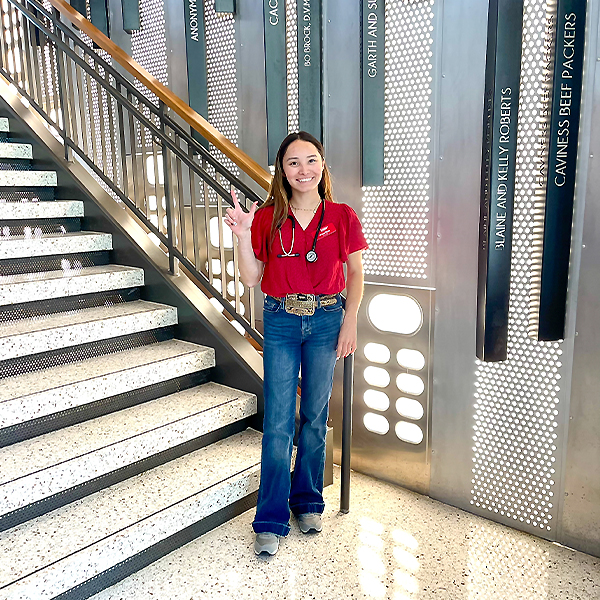
This Master of Veterinary Science graduate seeks to bring research and veterinary medicine to rural and regional communities.
Julianna Salinas was born and raised in Mission, Texas, a small agricultural community near the Texas-Mexico border. Her family owns a swine operation called Jolly Roger Show Pigs, where they raise show pigs for the livestock industry. For Julianna, this was the cornerstone of her upbringing.
“Growing up surrounded by livestock taught me the value of hard work, dedication and
compassion,” Julianna said. “Every early morning feeding and late-night farrowing
reminded me that caring for animals is more than a job, it’s a responsibility and
a privilege.”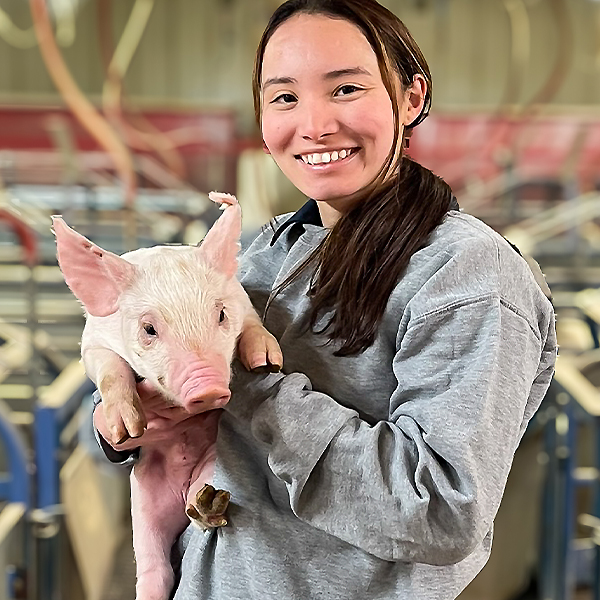
Life on the farm and in the show barn shaped her work ethic and sparked a lifelong passion for animal care. The experiences she gained through the livestock industry instilled resilience, responsibility and a deep appreciation for the people and animals that make agriculture thrive.
After graduating high school, she pursued her undergraduate degree at Texas Tech University. It was during her time at Texas Tech she crossed paths with Dr. Arlene Garcia, assistant professor of animal welfare and behavior at Texas Tech’s School of Veterinary Medicine.
“I never planned to pursue research,” Julianna said. “It wasn’t on my radar until I was selected as a TrUE Scholar and given the opportunity to work under Dr. Garcia.”
The Transformative Undergraduate Experiences (TrUE) Scholars program at Texas Tech provides students with opportunities to engage in hands-on, high-impact research projects alongside faculty mentors.
As a TrUE Scholar, Julianna teamed up with Dr. Garcia to pursue research in commercial swine and animal handling. This was the perfect opportunity for her to combine her previous experiences with swine with research to begin her quest to make an impact on the agriculture industry.
“That initial experience opened my eyes to how research can directly improve animal health and welfare,” Julianna said. “I quickly realized how much I loved the process, and it inspired me to pursue my master’s degree in veterinary sciences so I could keep contributing to meaningful, applied research in the livestock industry.”
Soon after finishing the program and earning her bachelor’s in animal science with a minor in chemistry, Julianna began to hear whispers of a new Master of Veterinary Sciences program developing at Texas Tech’s School of Veterinary Medicine in Amarillo, Texas. Julianna saw a new opportunity on the horizon to potentially continue her research.
As soon as the master’s program launched, Julianna enrolled without hesitation and
became one of the program’s pioneering students. This time she worked alongside Dr.
Heidi Villalba, assistant professor of neurophysiology and pharmaceutical science. 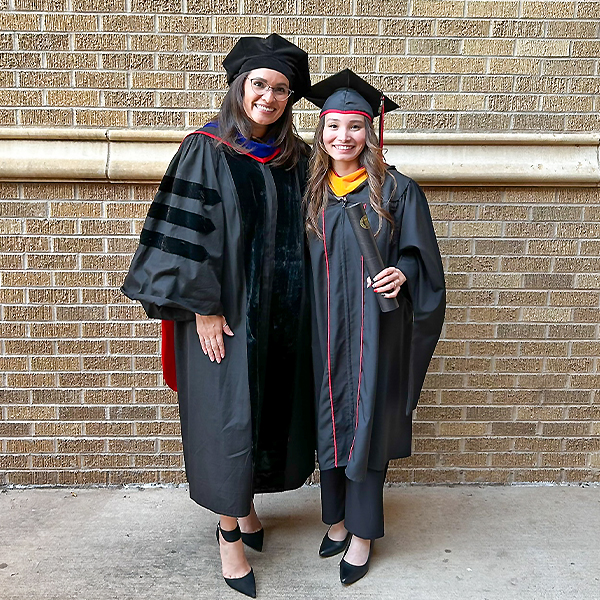
With Dr. Villalba’s expertise in neuroscience, Julianna was now able to bring her research to the next level by using a One Health perspective. Her goal of bridging the gap between science and the barn was within reach.
“Working with Dr. Heidi Villalba gave me the opportunity to expand further on my swine research,” Julianna said. “Through her guidance, I was able to learn how advanced techniques like LC-MS and Western blotting can uncover connections within the brain, immunology and animal health.
“Advancing my research also strengthened my knowledge that can tie into the livestock industry. Using a One Health perspective, this work also deepens our understanding of myo-inositol and its implications across other species, humans and repurposing of drugs which is a lab focus in Dr. Villalba’s Lab.”
As a master’s student, Julianna’s research focused on optimizing the detection of myo-inositol in swine using advanced techniques like LC-MS and Western blotting. She also studied how dietary supplementation with sodium alginate hydrogel beads impacted blood plasma and brain tissue levels of myo-inositol in sows and piglets. Her work improves stress mitigation, neurological development and overall swine health.
While Julianna would admit the main reason she was drawn to pursue her master’s degree was to continue her research, she also discovered other reasons why the School of Veterinary Medicine was the right fit.
“I was proud to be a part of the inaugural cohort of this new degree and help pioneer
a pathway for future scientists,” she said. “The opportunity to be on the front end
of a growing program, surrounded by supportive faculty and a strong agricultural foundation,
made Texas Tech’s School of Veterinary Medicine the perfect place to grow as a researcher.”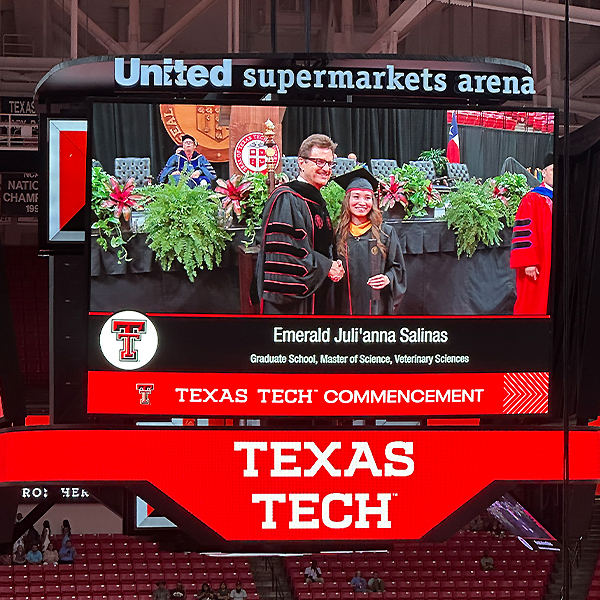
She saw first-hand the school’s emphasis on student-led research, students taking ownership of their projects and developing students as independent investigators.
“Texas Tech has provided outstanding mentorship, access to cutting-edge research tools and a supportive academic community,” Julianna said. “From presenting at conferences to refining my laboratory skills, I’ve been encouraged to grow professionally and intellectually at every stage.”
While gaining many skills, Julianna said the most valuable part of the graduate program at Texas Tech’s School of Veterinary Medicine is the opportunity to collaborate across disciplines.
“Whether it’s working with animal scientists, chemists or public health experts, I’ve
gained a deeper understanding of how interconnected our world truly is,” Julianna
said. 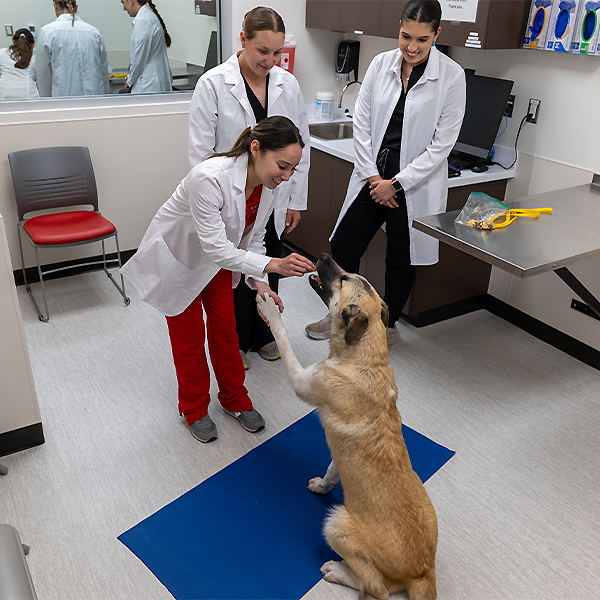
On August 8, Julianna walked across the stage to receive her Master of Veterinary Sciences degree. Three days later she returned to the School of Veterinary Medicine but this time seeking to become a veterinarian.
“My ultimate goal is to become a large animal veterinarian and serve rural and regional communities,” Julianna said. “I am passionate about combining hands-on veterinary care with a strong foundation in research to make a meaningful impact in animal agriculture.”
